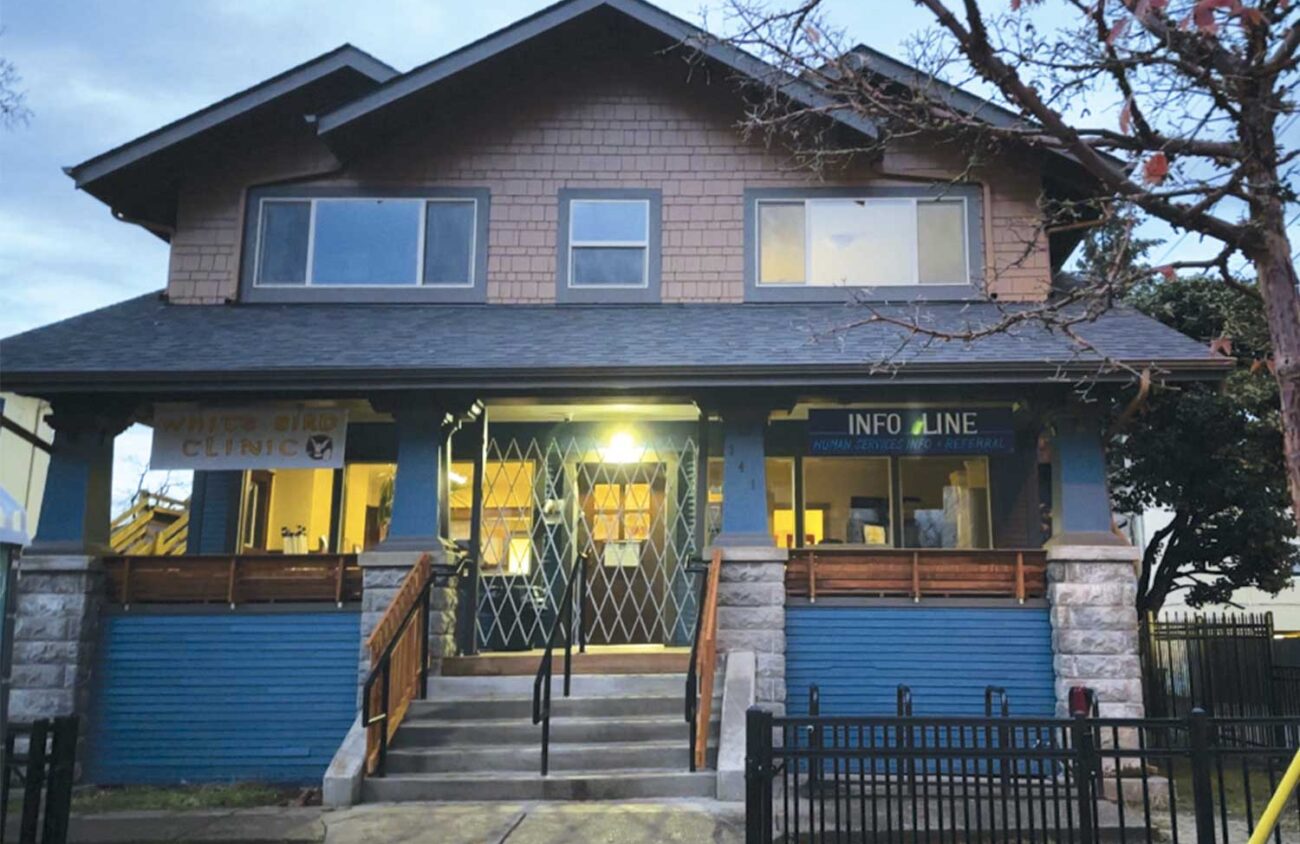White Bird Clinic’s Front Rooms program — which provides the lowest-barrier mail service and food and clothing distribution in Eugene/Springfield — will close on Dec. 13, due to tight budget concerns, the nonprofit’s executive director says.
“We are on track right now for this year to finish the year having lost $2.9 million,” Jeremy Gates, White Bird Clinic’s executive director, says. “Essentially, with the funding deficit we’re operating at, we think that we have about 15 to 24 months left before we close the doors.”
“This whole thing could shut down in a blink,” he says. “It’s either cut off the hand and save the patient or we leave the hand and the whole patient dies.”
On top of a $2.9 million operating deficit, Gates says White Bird Clinic paid out $2.7 million in four separate lawsuits. When Gates started as interim executive director in December 2022, he says “we had 13 active BOLI complaints and four lawsuits.”
A BOLI complaint can be filed against an employer for payment of wages, sick leave, discrimination or any other injustice in the workplace.
Due to the lawsuits, Gates says the nonprofit’s commercial insurance deductible — what you pay out of pocket — increased by 44 percent to around $500,000.
Now, after the Nov. 5 election, Gates says a new variable is the Trump administration. “We know that cuts are coming. We don’t know when,” he says. “We think the cuts are going to first be felt in 2027.”
Gates says Front Rooms costs White Bird around $1 million annually. However, he says, “We are cutting zero services.”
Services like mail delivery and clothing, food and medical supplies distribution will be folded into other White Bird Clinic programs. “Gear distribution, for example, will come out of our Measure 110 building, which is built, designed and paid for by Measure 110 for gear distribution,” Gates says.
The Measure 110 building, located at 647 Polk Street, is White Bird Clinic’s Harm Reduction & Treatment Center, which provides services beyond treatment like peer support and acupuncture.
Measure 110, passed by voter referendum in 2020, established Behavioral Health Resource Networks in every county and opened up grants for behavioral health organizations.
Gates says Front Rooms clients can go to other services across town, like Saint Vincent de Paul’s Eugene Service Station at 450 Highway 99.
However, Front Rooms Program Coordinator Bre Clark argues that no other service in town is as low barrier as Front Rooms. She says they never require a client to provide their Social Security number or their legal name.
“We knew that there were funding issues. There’s always been funding issues,” she says. “We’re meant to be the safety net, under the safety net. That’s why we’re not funded.”
Front Rooms is funded in full by other White Bird Clinic programs like CAHOOTS, Gates says. The program has been a part of White Bird Clinic since the nonprofit started in 1970. However, Front Rooms used to be a volunteer-run program. Now, it employs eight full-time and one part-time staff member.
Clark says the program is understaffed. To be fully staffed, Clark says they’d need to hire three more full-time employees. “Every single shift on our schedule is understaffed,” she says.
They still serve, on average, 110 clients daily.
“I wake up crying, because not only is my future uncertain, the future of everyone that we serve is very uncertain,” she says. “We’re all really burnt out.”
Krysta Delfino, a Front Rooms employee, says “taking away another option doesn’t feel like it’s lowering barriers for people.” Because Front Rooms isn’t grant funded, it isn’t beholden to any restrictions for services, Delfino says. “There’s a lot of flexibility in the program to be dynamic and meet the needs of folks while not having to say, ‘Oh, we cannot provide this, our grant doesn’t allow us to do it,’” they say.
Gates says that is exactly the problem.
White Bird Clinic is a Federally Qualified Health Center (FQHC), which requires it to offer full medical and dental services to receive federal funding. Other services, like HOOTS and CAHOOTS, are bound by contract to Lane County and the cities of Eugene and Springfield.
“There’s only one program that has no federal, no state, no local and no contractual mandates to stay open,” Gates says of Front Rooms. “We do not legally have to provide mail and package service to our clients. We do it because it’s important and valuable, but we don’t have to legally do that, which means there’s no funding out there for it.”
During the COVID-19 pandemic, Gates says the nonprofit accepted $3.6 million annually (split into two payments of $1.8 million) from President Joe Biden’s 2021 American Rescue Plan Act. The last appropriation of that funding was on July 1.
Now, Gates says the organization will have to come up with $1.8 million for the rest of their fiscal year, which runs from July 1, 2024, to June 30, 2025. Otherwise, they’re going to have to consider what else to shave off from White Bird Clinic’s programs.
“I’m going to try very hard not to shave anything else off. I didn’t want to shave Front Rooms off, but we are staring down a tunnel, and I don’t think that light at the end is daylight. I think it’s a train coming at us,” Gates says.
To donate to White Bird Clinic, visit WhiteBirdClinic.org/Donate.
Help keep truly independent
local news alive!
As the year wraps up, we’re reminded — again — that independent local news doesn’t just magically appear. It exists because this community insists on having a watchdog, a megaphone and occasionally a thorn in someone’s side.
Over the past two years, you helped us regroup and get back to doing what we do best: reporting with heart, backbone, and zero corporate nonsense.
If you want to keep Eugene Weekly free and fearless… this is the moment.
